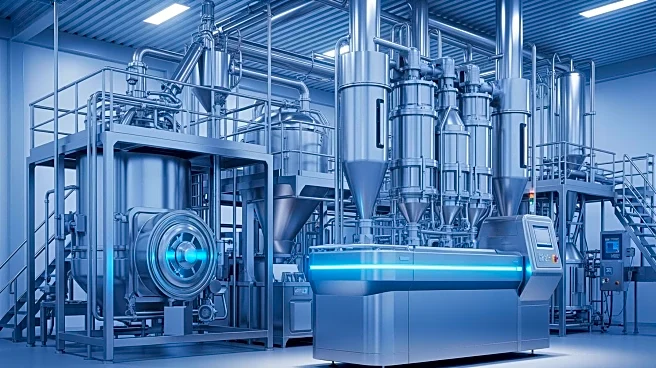What's Happening?
Bel Group, in collaboration with French start-up Standing Ovation, has successfully developed a method to produce casein proteins from whey at an industrial scale using precision fermentation. This innovative process involves using patented microorganisms
to transform acid whey, a by-product of Bel's cheese production, into all three major casein proteins: alpha S1, alpha S2, and beta. The process creates a closed-loop system, significantly reducing waste and environmental impact. A life cycle assessment indicates that this method cuts CO2 emissions by 74%, land use by 99%, and water consumption by 68% compared to traditional animal-derived caseins. Despite the technical success, regulatory approval and pricing remain hurdles for market entry.
Why It's Important?
This breakthrough in precision fermentation represents a significant advancement in sustainable food production, particularly in the dairy sector. By utilizing whey, a by-product of cheese production, Bel Group and Standing Ovation are addressing environmental concerns associated with traditional dairy farming, such as high carbon emissions and land use. The ability to produce caseins from whey could lead to more sustainable dairy products, aligning with Bel Group's commitment to becoming carbon neutral by 2050. This innovation could potentially transform the dairy industry, offering a more eco-friendly alternative to conventional dairy proteins.
What's Next?
The next steps for Bel Group and Standing Ovation involve navigating regulatory approvals, particularly in Europe, where precision fermentation-derived caseins are still pending approval. In the U.S., some progress has been made with self-affirmed Generally Recognised as Safe (GRAS) status for these proteins. Additionally, achieving competitive pricing is crucial for widespread adoption. As industrial-scale production continues, the companies aim to expand partnerships with other major dairy players, potentially accelerating the transition to sustainable dairy products.
Beyond the Headlines
The development of casein from whey through precision fermentation could have broader implications for food technology and sustainability. It highlights the potential for biotechnology to create closed-loop systems that minimize waste and environmental impact. This approach could inspire similar innovations across other sectors, promoting a shift towards more sustainable production methods. Furthermore, it raises questions about the future of traditional dairy farming and the role of biotechnology in addressing global food security and environmental challenges.















